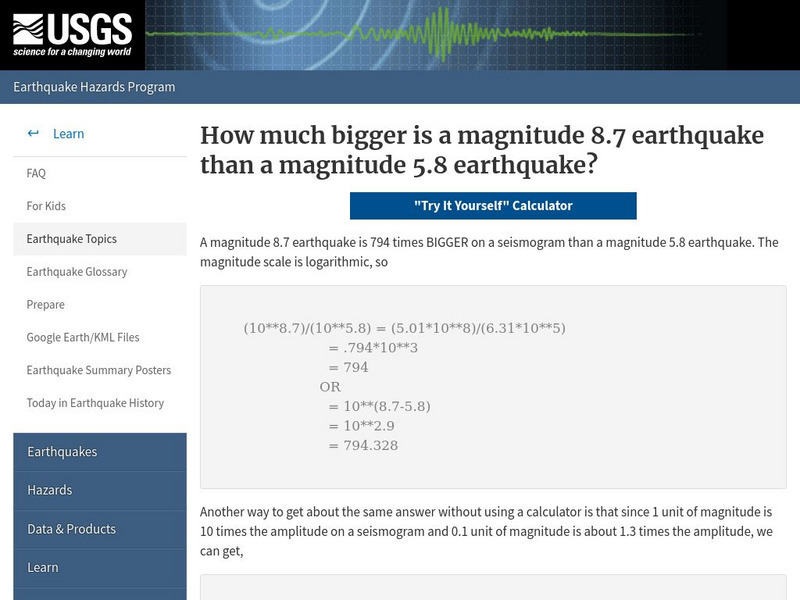Curated OER
Magnitude of the Richter Scale
Students examine how a Richter scale operates. They create a booklet illustrating each rating on the scale. They discover how engineers use different measurement tools.
Curated OER
Earthquake Power
In this earthquakes worksheet, students learn about the measurements of earthquakes on the Richter scale. They answer six questions about the magnitudes and sizes of earthquakes using two tables of data about earthquakes and the Richter...
Curated OER
Evaluating an Illinois Earthquake
Learners develop awareness of occurrences of earthquakes in Illinois and their past and potential future damage, and examine distribution of earthquakes in central U.S. regions.
Curated OER
What are Earthquakes?
Here is a scientific presentation of earthquakes. The elastic rebound theory is explained, as well as the different types of waves and how they are measured. Just a note: Slide number 15 has a diagram that is upside down. Enable editing...
Curated OER
Life Along the Ring of Fire
Young scholars research geological forces that create the Ring of Fire and its effects on cultures. They write reports on how natural disasters influence societies.
Curated OER
Types And Magnitudes Of Earthquakes
Students investigate the concept of earthquakes and the different types of magnitudes. They research the Richter scale and how it is used to measure the intensities of earthquakes. Students then apply the concept by completing a...
Curated OER
Shake, Rattle and Roll
Sixth graders explore the causes and effects of earthquakes. They also collect and analyze data in graphs. They also use the Internet to research earthquakes
Curated OER
Properties of Logarithmic Functions
Students solve exponential functions. In this algebra instructional activity, students identify the properties of logarithmic and exponential functions. They graph their functions and solve using change of base formula.
Curated OER
How do we measure global earthquakes?
Students examine three seismograms of a recent South American earthquake recorded by USGS stations. They measure the S-P distance and use a P and S wave travel-time graph to find the epicenter distance for each seismogram. In addition,...
Curated OER
Earth Science: In Depth Look at Earthquakes
Students engage in an interactive Internet lesson covering the reasons and results of earthquakes. After reading eyewitness accounts and viewing animations, they use seismograms to measure and locate the epicenters. In an ongoing study,...
US Geological Survey
U.s. Geological Survey: How Much Bigger?
This resource provides information about the magnitude scale, and allows users to try to figure out the difference between earthquake sizes.












